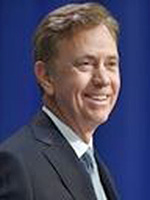Staff Reporter
Connecticut Gov. Ned Lamont Releases Draft Plan on Infrastructure Investment

As the Connecticut General Assembly’s legislative session draws to a close, Gov. Ned Lamont released a working draft of an infrastructure funding proposal that lawmakers will rely on during a special session focused solely on transportation and economic development.
The General Assembly’s regular session adjourns June 5. Because the installation of electronic tolls, a fiercely contested subject, likely will not be resolved before then, the governor has proposed a special session later this summer to further debate the issue. Revenue from the tolls will be deposited into the Special Transportation Fund, which is used to finance highway and infrastructure improvements.

Lamont
Lamont released his draft of the Transportation Infrastructure Investment proposal May 21, allowing legislators and constituents time to review the document and form questions. Publication of the draft came shortly after Lamont met with state lawmakers, who agreed to prioritize a final budget before addressing transportation investment.
“Passing a fiscally responsible budget early is the first part of that equation. Doing so will allow mayors and first selectmen to know for certain what their budgets will look like for the next biennium and allow them to plan accordingly,” Lamont said in a statement. “The second part of the equation is to tackle our woefully underresourced transportation infrastructure system. We know it’s slowing our economic growth and hampering our competitiveness.”
The working draft tasks the commissioner of transportation with adopting regulations that provide alternative methods for people without credit cards to pay tolls and outline the manner in which a transponder should be attached to a vehicle. The commissioner also needs to submit a proposed schedule of toll rates that considers variable rates based on peak and off-peak travel periods, congestion, vehicle type, discounts and low-income toll customers.
The proposed schedule of toll rates will be approved or rejected by the Connecticut Transportation Commission, which the draft plan seeks to establish. The 13-member commission will consist of representatives of the Senate, the House of Representatives, the state treasurer, the Office of Policy and Management, the governor’s office and the departments of Transportation, Economic and Community Development, Energy and Environmental Protection and Housing. The group also will approve or reject ConnDOT’s five-year transportation plan, hold public hearings and establish task forces.
The proposed initial rates are 4.4 cents per mile during peak travel periods and 3.5 cents per mile during off-peak times. However, this figure may be plus or minus 30% (about 1.3 cents) to allow ConnDOT flexibility in ultimately getting the rate approved by the U.S. Department of Transportation. These rates will be “frozen” for three years.
Prior to constructing a tolling gantry on any stretch of highway, ConnDOT will hold at least one public meeting in the general vicinity of the proposed toll facility to gather comments. Those who fail to pay tolls risk civil penalties of up to $25 for first violations, $50 for second violations and $100 for subsequent violations.
The working draft confirms that there will be no more than 50 tolling gantries posted across interstates 95, 91, 84 and the Merritt Parkway.
Sacred Heart University Pio... by on Scribd
Lamont’s tolling plan has faced harsh criticism, including from members of the trucking community and state lawmakers. A poll from Sacred Heart University’s Institute for Public Policy published in March indicates that 59% of Connecticut residents opposed implementing electronic tolling.
Lamont has stated that he is willing to compromise with Republican and Democratic lawmakers to bolster the Special Transportation Fund, allow for short-term borrowing until tolls are set up and establish a reliable revenue stream.
“The importance of this issue demands that we continue to work as long as needed to find the best way to move us forward as a state,” Speaker of the House Joe Aresimowicz said in a statement. “A special session is never the preferred approach, but our responsibilities don’t go away with a date on the calendar.”




